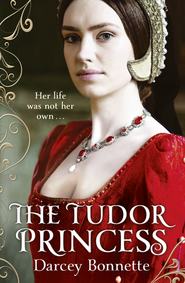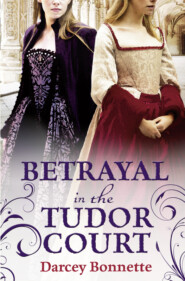По всем вопросам обращайтесь на: info@litportal.ru
(©) 2003-2025.
✖
Rivals in the Tudor Court
Настройки чтения
Размер шрифта
Высота строк
Поля
It is a boy! Another bonny boy! We call him Henry after the king and his son. He is a delight, so blonde and rosy. His eyes are lighter than his brother’s; their silvery blue gaze penetrates the soul as he studies me, his little face earnest as a judge’s. I find myself particularly attached to this wee mite, perhaps because I was here when he was born, and I love holding him, caring for him. It touches me to feel his tiny hand curling about my thumb and I marvel at his perfect small feet, an example of God’s attention to the finest details.
I never knew I could love like this.
The princess and I spend many an hour in the gardens with the children. She laughs more now. Our toddling Little Thomas brings her delight as he discovers his world; he is everywhere at once and it takes a great deal of energy to keep up with him, but it is energy we are happy to spare.
When Thomas is out of his swaddling bands and put into short breeches, assembling words into short sentences, following me about wherever I permit him to go, my princess tells me I should begin considering names for our third child.
I stare at her in wonder. How is it a man can be this happy?
The princess is eight months gone with child when the nurse tells her our baby, our Henry, was found dead in his cradle one spring morning.
I have never heard my princess raise her voice, but now she is screaming. The sound rips from her throat, raw and terrifying. She sinks to her knees before our lamb’s little cradle, thrusting her long arms skyward, bidding the Lord to answer for His decision. When at last she has collected herself, she turns to me, staring, large green eyes filled with questions I cannot begin to answer.
Tears stream down my cheeks unchecked as I approach the cradle. He does not look dead at all, his tiny head lolled to one side, eyes closed, fists curled by his chin. He is so still. I reach out to touch him, then draw back in horror. The warmth I had treasured when cradling him so close is gone. He is cold; the breath of life has departed.
I sob, great gasping, gulping sobs of despair.
There is no reason. There is no good reason.
I turn to the nurse, hot anger replacing the tears that I now wipe away in disgust. “Why was he not attended to?” I seethe.
The woman backs away in horror. “But he was—he was as he is every night, my lord. We checked on him right good, sir.”
“If that were so, he would be here with us!” I cry. “You are dismissed! This whole nursery staff is to leave this instant and I do not care where you go! May God rot your souls for your negligence!”
The woman retreats with the two rockers and nursery maids. I hear them fleeing, their voices raised in panic.
“Pray you make it out of here before I reach the door!” I shout.
I turn once more to the cradle. What do I do now?
“He was perfect,” I tell the princess in softer tones, shaking my head in agonised wonder. “I do not understand…. He was perfect. How can he be here one day and gone the next?”
The princess shakes her head, then sinks to the floor, rocking back and forth, inconsolable.
He did not have many effects. He did not live long enough. But I did save his first pair of little shoes, tucking them into a drawer in my desk, a strange reminder of lost perfection. I will not look at them … often.
We bury him at Stoke. He is too small to be traversed to the family chapel at Lambeth, so I do not bother. We receive sympathy from the royal family along with the Howards—indeed, everyone is well acquainted with loss. My mother had passed that same year and if anyone could have offered me counsel on the subject, it was she. But she is gone and the earl has remarried. Somehow his marrying within months of her death does not make his grief altogether convincing.
As it is, I do not care about anyone’s shared grief or stories of their own losses. All I can think of is my own, of the princess’s face as she asks me wordlessly, Why?
How in God’s blood am I supposed to know?
I fear for the princess, for the faraway look in her eyes. She no longer laughs. We do not speak to each other very much.
We await the birth of our next child, neither of us filled with the hopeful anticipation we harboured for the first two.
Yet when she brings forth another little boy, the knot in my chest eases a bit. He takes after me with his dark hair and skin, but is long like his mother. He seems healthy. I want to love him. I want to enjoy him. I don’t want to grieve anymore.
We call him William, Wills for short.
As he grows I find myself relaxing a bit. When he reaches nine months, the age our Henry was when he was taken from us, tension grips me. I awake in the night, crying out in terror. Sometimes I sit by his cradle all night to make sure his soul is not stolen from me.
But he lives.
It seems God will let us keep our sturdy little Wills.
In 1503 I am blessed with two other events. The first is the birth of a daughter, my own little girl to pet. We name her Margaret after our niece, Princess Margaret Tudor, which leads me to the second event. We are to accompany Princess Margaret to Scotland with my father and the rest of the family to witness her marriage to King James IV. I am thrilled about the journey for so many reasons, not only because of the royal exposure but because I will be with my entire family again. It will be a wonderful opportunity to acquaint myself with my father’s new bride, Agnes Tilney, and an excellent chance for the children to get to know their Howard relations.
“Perhaps I should stay home with the children,” my princess tells me before we depart. “I should not feel comfortable leaving them with a nurse, and bringing them does not seem prudent either. They could catch a chill, what with the nasty Scottish winds.”
I offer a dismissive laugh. “Father said the whole family is to go. I want to bring the children, treat them to a spectacle. We didn’t get to collect Princess Catherine from Aragon when she came to wed Prince Arthur, after all.”
My princess rests a slim hand on her heart. “God rest his poor soul,” she murmurs of the late prince. “He was so young and frail….” She casts her eyes to our son, little Wills, who cannot be described such. He is as robust as Princess Catherine’s new betrothed, young Prince Henry. She is not thinking of the late prince, however, or of the new Crown Prince. She is thinking of our boy, our Henry, and fearing the others perishing of the Scottish wind.
I clear my throat. “No use dwelling on all that,” I tell her, hating the awkwardness that has arisen between us since the baby’s death. “We are going to have a wonderful journey, my sweet, you will see. The children are going to love it. And they should be there to attend their royal cousin.”
My princess offers a sad nod of acquiescence and I find myself balling my fists in frustration, wishing just once that I could see a grin of joyous abandon cross that beautiful melancholy face.
Our Maggie is too young to appreciate anything, but she points her chubby little finger at her beautiful cousin Margaret Tudor, saying “red” in reference to the princess’s lustrous red mane, which seems to be a Tudor trait.
Thomas and Wills are beside themselves with pleasure as we progress north to Edinburgh and I tell them about all the famous battles that have occurred in this town or that.
No one looks at me the way they do; no one admires me as much. I am brought to tears by their flagrant adoration; as I had never admired many growing up, I didn’t realise children were capable of it themselves.
“When they are given love, it is returned,” says my princess when I comment on this as we sit in Holyrood Abbey, watching Princess Margaret become the Queen of Scots. She squeezes my hand. “No one will ever love you like a child,” she adds.
I press her hand in turn. A lump swells my throat. I wonder who our Maggie will marry; it seems odd to think the thought of it affects me far more than marrying off the boys. I suppose all fathers feel that way about their little girls.
I wonder how the king feels. Is it easy giving one’s children up to faraway kingdoms for political expedience?
King Henry is a practical man, however. I would be surprised if he gave himself over to such fancies. Indeed, I should take care that I don’t become some kind of blithering idiot, crying at weddings like an old grandmother.
I am fortunate that I do not have to think about alliances just yet; I have years before my Maggie is marriageable.
She will be at my side a good long time.
We return to Stoke to pass a happy autumn. The children are looking forward to Christmastide. Maggie is running everywhere and is far too smart for her own good, and Thomas is itching to have a suit of armour of his own. I tell him he must wait a year but am pleased to practise archery with him. He is a fine boy, full of potential and enthusiasm. He will be an asset to any king’s court.
These are happy days. My princess’s smile is brought on a little easier now. I have stopped waking up at night to check on the children. I enjoy living the life of a country knight.
My grandmother passes away that year and I admit little grief as her death was the stipulation in allowing the princess and me to live in more comfort. Besides, she was one of the few who lived to a ripe and proper age, and there is no use mourning a full life.
I save the mourning for the young and there are plenty of young to mourn for.
That winter Wills takes ill with a fever. He writhes and twists in his little bed, his black eyes wild as they make helpless appeals to the princess and me. We do not know what to do aside from calling the physician, who can only bleed him.
I hate watching the leeches attach to my little boy’s back; I cry when the butcher of a doctor makes little slits in the tender skin to allow escape of the bad blood that has corrupted my son’s humours.








